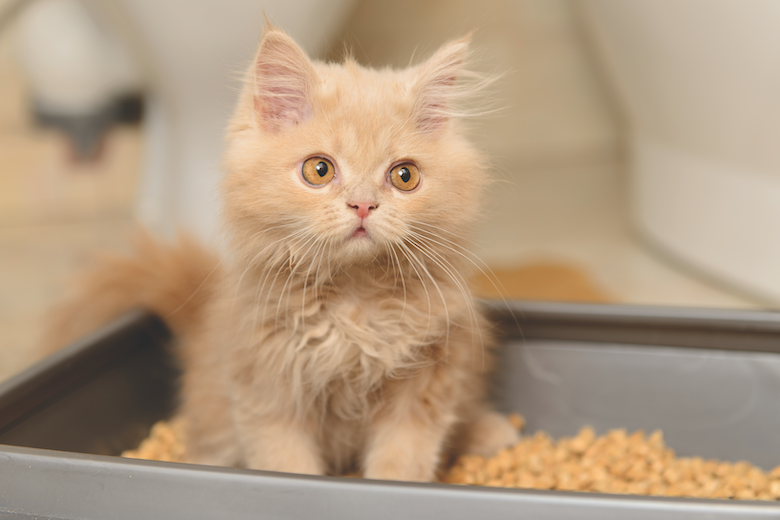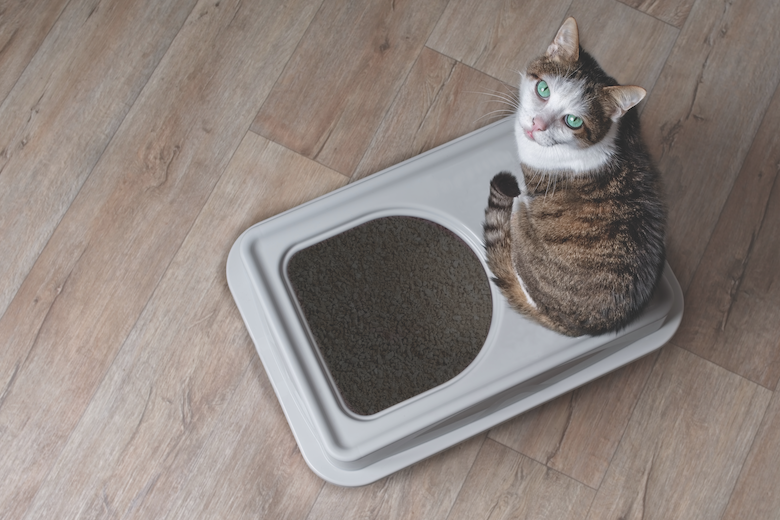Cats have a reputation for being low-maintenance pets. One of the reasons: they are super easy to potty train. In fact, they instinctively know how to use a litter box. All you need to do is show them where it is by placing them in it, and they know what to do.
“The coolest thing about a little kitten you’ve been bottle feeding is, after you put him in the litter box on a full tummy for the first time, he starts digging,” says Dusty Rainbolt, a feline behaviorist who has rescued and rehomed more than 1,500 cats. “It’s the most amazing thing ever. The internal programming of a kitten is incredible.”
That’s because cat litter mimics a cats’ preferred bathroom in nature. Cats are not the only species to bury their waste. Other species that bury their waste include woodchucks, minks, armadillos and weasels. In the wild, felines dig a hole, do their business and then bury it — and for good reason.
“It appears to be a survival mechanism,” Dusty says. “Covering their waste conceals their presence from predators and more dominant cats.”
Feline bathroom habits
Interestingly, large cat species that have no predators — lions, tigers and jaguars — do not bury their waste. Instead they use their excrement to claim their territory. Smaller cat species bury their waste to keep predators off their tracks and prey off their guard.
“Cats will normally eliminate on the outer edges of their territory, not in their home base,” Dusty says, adding that cats do this to protect themselves from parasites. Very rarely do cats mark with poop, Dusty says. They mark with urine. But again, they spray mark the edges of their territory.
Knowing how instinctive it is for cats to use the litter box should alert you that something is wrong if they stop. Dusty, the award-winning author of Cat Scene Investigator: Solve Your Cat’s Litter Box Mystery, says that kittens come programmed with that instinct.
“That instinct is very pure. As they get older, we do things to mess with that programming.”
And what are some of the things we do? “We put the food bowl next to the litter box,” Dusty says. “No one wants to to eat in the bathroom. We put repellents in the litter box, scented litter, or we clean it with an orange cleaner or use something that feels uncomfortable on their feet.” Cats are repelled by citrus scents. “Or they are bullied and they’re afraid to go into the litter box,” she says. “When they’re bullied, they will find another place to go.”

Photo: takhova | Getty Images
Odd litter box behaviors
Sometimes very young kittens can’t quite get the hang of the litter box. They may play in it, sleep in it or avoid it altogether. If they’re avoiding it, it could be that their mom wasn’t around to show them how to use it or the litter box itself might be too big for them. Make sure they can get in and out of it by themselves.
Adult cats prefer more space in the litter box, enough to turn around in comfortably. “My cats’ favorite box is an Ace Hardware utility tub that’s 3 feet long and 2 feet wide,” says Dusty. “The kittens will slide around, and litter scatters everywhere.” But is that a bad thing?
“That’s the response you want,” Dusty says. “A cat should enjoy going to the litter box. He should enjoy digging in the litter, kicking it around. If he’s doing his thing and leaving immediately, he has a problem with the facilities you’ve provided. The box is dirty, he doesn’t like the smell or texture of the litter, the box is too small, the box is covered. He should want to dig.”
Dusty recalls one cat who would leave his favorite toy in the food bowl, the water bowl and the litter box. “The box is very clean, so he was comfortable enough to put his toys there,” she says.
If your cat won’t use the litter box
If your cat stops using the litter box, make an appointment with your veterinarian to rule out a medical cause. Certain health conditions can cause pain when urinating or defecating, and your cat will associate that pain with the litter box.
Once you have ruled out a possible medical condition, consider possible behavioral triggers. A new person or pet in the household or even a neighborhood cat in your yard can create anxiety for your cat. Cats may stop using the litter box if it’s near something loud and scary, like a barking dog or noisy appliance. Or if it’s a neighborhood cat, your cat may start marking territory.
If anxiety and territorial issues are not to blame, it could be the litter or litter box itself. It could be too small or there may not be enough litter boxes. It also might not be clean enough.
Dusty says signs a cat has a problem with the litter box include:
- †Sitting on the edge, reluctant to put his feet down
- Shaking his paws
- Running out after using the litter box
Sometimes it’s not the box but the litter. “Cats prefer sandy, unscented litter,” Dusty says.
“If you go to the beach barefooted, you want to walk on nice soft sand, not something that feels like gravel. If you want to know how it will feel on a cat’s paws, when you pour the clean litter, press your forearm on top of it to see how it feels. If it’s sharp and uncomfortable, your cat feels your pain.”
A cat’s sense of smell is also stronger than ours. Things we find pleasant or innocuous may actually repel a cat, Dusty says. “They’re also closer to it. When we’re scooping, we’re still 2 or 3 feet above it.”
Like humans, cats are particular about their bathroom habits and want a clean commode. Work with them and learn from them to provide what they like.
Top photograph: Lightspruch | Getty Images
Read Next: What You’re Doing Wrong With Your Cat’s Litter Box
